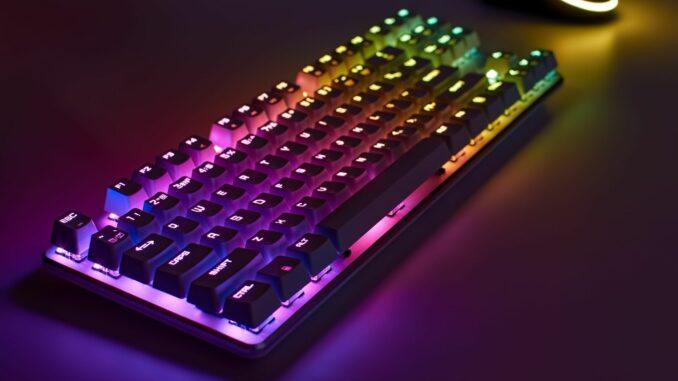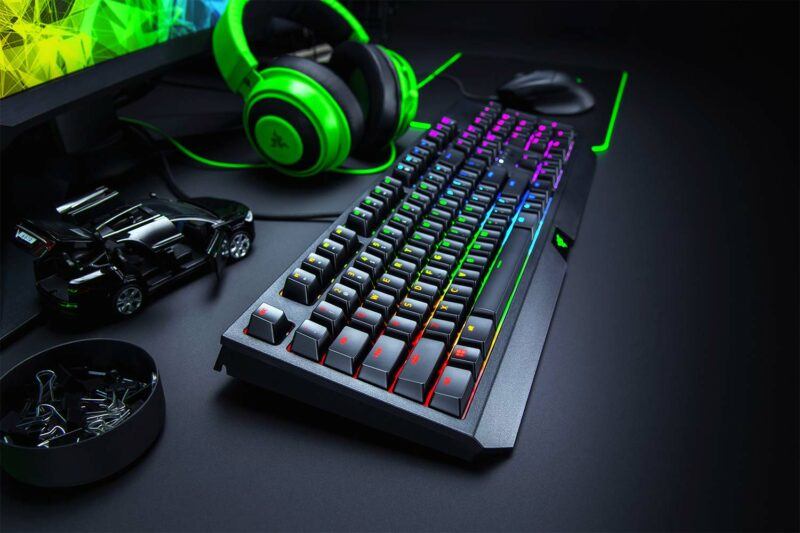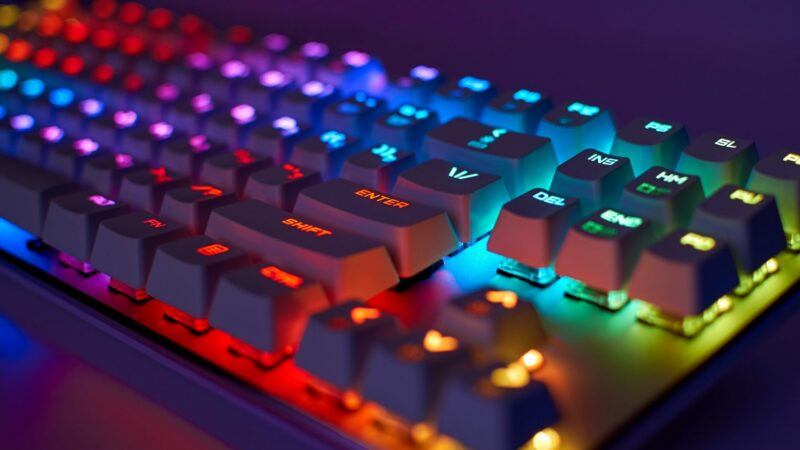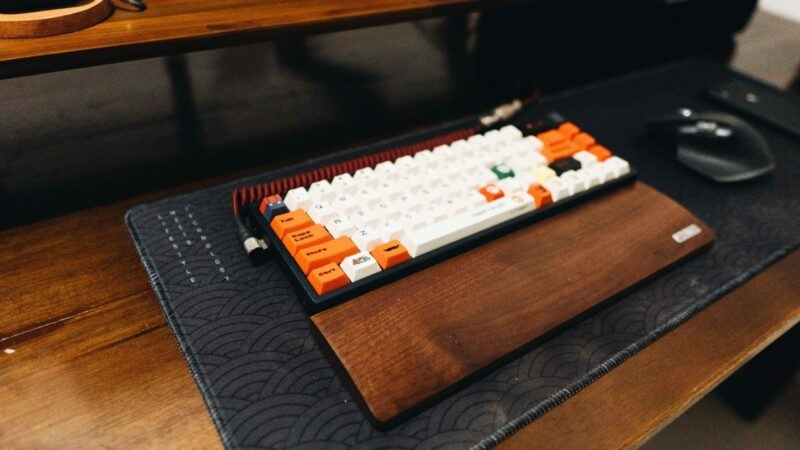
There’s something innately satisfying about the clatter of a keyboard. Gamers, writers, programmers, anyone who has spent a great deal of time before can attest to it.
Maybe it comes from a generation’s nostalgia for typewriters. Maybe it’s simply the satisfaction of being productive. Maybe it’s the secret joy of annoying the other patrons of cafés.
But no matter where it comes from, a keyboard’s clatter is an integral part of deciding which to buy.
Often the decision of how ‘clicky’ you want your keyboard comes down to whether or not to get a mechanical keyboard. Mechanical keyboards offer many benefits to onboard or modern membrane keyboards, and most notable among them is that clatter.
That being said, they often run higher prices than modern membrane keyboards and can be confusing with which switches to buy and what they mean.
This post will overview the difference between membrane and mechanical keyboards, the terminology surrounding mechanical keyboards, their advantages, and drawbacks, as well as who mechanical keyboards benefit the most.
All of this will go to answering the burning question, are mechanical keyboards with it?
What is a Mechanical Keyboard?

While all keyboards have roots in typewriters, mechanical keyboards lay just one step back in that evolutionary tree than the modern membrane keyboard. They were popularized in the 1980s with companies like IBM and Cherry MX as home computing became more popular and affordable.
Mechanical keyboards function by using physical switches beneath each key. That switch is composed of metal contacts that are held apart by a spring when the key is upright and connected when the key is pressed.
That physical switch, the connection between those metal contacts, is what causes that wonderful click-clack clatter for which mechanical keyboards are (in)famous.
A key feature of mechanical keyboards is their accuracy with simultaneous keystrokes. Due to the precision of physical switches, mechanical keyboards are much better than modern membrane keyboards at picking up keystrokes that occur simultaneously or nearly simultaneously.
This feature is called a key rollover and can vary from keyboard to keyboard. Some keyboards can recognize half a dozen simultaneous keystrokes, while others are built to recognize every keystroke no matter how many are pushed simultaneously.
- YOU MAY ALSO LIKE: Best Wrist Rests For Typing and Gaming
What is a Membrane Keyboard?
Most keyboards today are what are known as membrane keyboards. Membrane keyboards became popular in the mid-1990s and came to dominate consumer electronics because they were cheaper to mass produce and more resistant to dirt and dust than mechanical keyboards.
Rather than using physical switches, membrane keyboards function by connecting circuits.
Membrane keyboards use a layer of rubber or silicone that sits beneath the entire keyboard. Within that membrane are domes that sit beneath each key. When the key is pushed, the rubber membrane presses the dome into the corresponding circuit and the keyboard recognizes the keystroke.

Complications and Customizations
So that distinction between the membrane and mechanical keyboards seems easy enough to understand right? Well, yes and no.
Not only are there different types of both membrane and mechanical keyboards than the ones explained above, but there are many other factors that influence how the keyboard functions and feels.
Factors like travel distance, noise level, actuation force, and tactile bump can entirely change how similar keyboards feel to type upon. These factors, especially for mechanical keyboards, are very customizable because it is easy to replace the switches and keys of a mechanical keyboard.
When it comes to mechanical keyboard switches, the dominant company is still Cherry MX. They have an incredible line of switches that run the gamut of loud to silent, hard to soft, longer to shorter travel, and everything in between.
Of course, other companies like Razer also make switches, allowing you to find very specific switches depending on your taste.
We discussed types of switches, switch brands, and what they do in our Mechanical Vs Membrane Keyboards article, so we won’t go into too much detail about them here. Sufficed to say there are many, many ways to make that clatter fit your tastes.
- READ ALSO: Best TKL Mechanical Keyboards
Mechanical Keyboard Terminology
Before we go any further, a few definitions might go a long way into helping you understand what people mean when they talk about keyboards.
Mechanical keyboards and keyboards writ large have terms and slang that can catch newcomers off-guard. There is a wonderfully in-depth dictionary over at Mechanicalkeyboards.com, but here are the basics you need to know:
• Bottoming out – pressing a key down fully
• Travel – also known as ‘actuation distance’ or ‘travel distance,’ travel is the physical distance a key much be pressed to bottom out and register a keystroke
• Noise level – this term is a rabbit hole in and of itself. Enthusiasts will literally differentiate ‘clicks’ from ‘clacks,’ but at a macro scale, the noise level is what it says on the box: how loud a noise each key makes when pressed
• Actuation Force – the amount of force needed to press a key
• Tactile Bump – also simply known as ‘tactile,’ tactile bump is the impact felt from bottoming out
• Chattering – also known as ‘key bounce,’ chattering is when a single keystroke is registered as multiple. Most mechanical keyboards come with firmware to suppress this error
• Tenkeyless (TKL) – A keyboard without a number pad. Literally, a keyboard that is ‘ten key less’
• Compact – This term refers to any keyboard that is smaller than the standard size. Compact keyboards can also be referred to as simply the percentage size they are of a full-size keyboard. For example, an 80% keyboard is 80% the size of a full-size keyboard
• Ergonomic – This term refers to keyboards designed to better fit the angle of wrists, the position of hands, or overall body posture. These changes can be as slight as changing the angle of the keys, to as much as having separate keyboards for each hand
• N Key Rollover – (NKRO) N Key rollover is the term used to describe how many simultaneous keystrokes a keyboard can process. The ‘n’ from this term comes from the mathematical term for all natural numbers. In this case, it represents how many keys a specific keyboard can interpret at one time. For example, a keyboard described as 6KRO is able to interpret 6 simultaneous keystrokes. Keyboards described as NKRO are able to interpret every key pushed simultaneously.
As stated above, there are many more terms about types of a rollover, different errors, and specifics of individual switches. But the above are the most common and useful when it comes to understanding what mechanical keyboards do, and how they are described.

Pros and Cons of Mechanical Keyboards
While it’s hard to argue that white gaming keyboards don’t look great finishing your gaming rig, the mechanical keyboards marketed towards gamers or programmers are simply tools.
They have specific pros and cons that make them more or less beneficial depending on what you intend to be doing with them. So, to better answer the question of who mechanical keyboards are for, and therefore, are mechanical keyboards worth it, it makes sense to examine these pros and cons first.
Pros
Customization – The most apparent advantage of a mechanical keyboard is simply how customizable they are. Nearly every aspect of mechanical keyboards can be tweaked, changed, and altered to fit your taste.
Don’t like the loud clatter of keys? Try the Cherry MX Silent Red switch that has no tactile bump nor click.
Do your hands hurt after a long gaming session? A wide array of ergonomic keyboards seek to alleviate hand and wrist pain. The list goes on and on.
This point of customization should be underscored simply because of how often keyboards are used. Many of us work in front of a computer and go home to our own computer, literally spending hours each day before one.
Mechanical keyboards offer the ability to make that simple tool easier to use, more efficient, or more comfortable, or all of the above.
Small changes like travel distance can make a huge impact on your experience with a keyboard simply because of how often we use them. Finding one’s preferences via this customization, therefore, can’t be overstated.
Durability – Mechanical keyboards run on the pricier side of keyboards (The other shoe had to drop eventually). But here that is a pro! Because of that cost, they are meant to withstand tens of millions of keystrokes, many times more than an average membrane keyboard. Now that is an impressive number, but what happens if a key does break?
Well, here too mechanical keyboards have an edge: it is incredibly easy to replace keys. Going hand in hand with customization, because of how easy it is to change keys on a mechanical keyboard, if one breaks, you can easily replace it.
Membrane keyboards, on the other hand, are nearly impossible to fix due to the nature of not being physical switches but circuits. And often the cost of fixing a membrane keyboard can be more than it is worth in the first place.
Simultaneous Keystrokes – As stated above, mechanical keyboards are notoriously good at accurately understanding simultaneous keystrokes. They can range from being able to pick up just a few simultaneous keystrokes to being able to understand if every key on the keyboard is pressed at the same time.
That level of accuracy for simultaneous keystrokes is incredibly important for gamers, which is why mechanical keyboards are industry standard. But it also has benefits for many other keyboards uses.
Increased Accuracy and Typing Speed – Talking about the overall typing accuracy of a keyboard is a tricky thing.
Various experts on keyboards claim mechanical keyboards increase both typing speed and accuracy. They say that because of the specificity of switches versus membrane keystrokes as well as the auditory feedback of a more clicky keyboard, typists and gamers and writers will type more accurately, and therefore quickly on mechanical keyboards.
While there aren’t many studies about words per minute across membrane versus mechanical keyboards, it does make sense that a more comfortable, responsive, and higher quality keyboard will increase speed and accuracy.
Moreover, customizing what best suits your typing preferences will certainly help you type more comfortably, therefore more accurately and quickly. Mechanical keyboards at the very least offer this possibility.
Ease of Cleaning – When was the last time you cleaned your keyboard? That daunting task might be a bit easier if it was a mechanical keyboard. The ability to easily remove keys makes cleaning them more manageable.
Hopefully, that ease will allow you to remove the detritus of maybe years of use, and perhaps make cleaning a more regular responsibility.
Programmability – Another unique aspect of mechanical keyboards is their ability to be personally programmed. That means you can change the default input of keys to other actions.
Not only does this allow you to break away from the confines of QWERTY, but also make changes to the layout of your keyboard that could potentially allow you to type even more accurately and quickly.

Cons
Price – Of course, the biggest drawback of mechanical keyboards is the price tag. Not only do the keyboards themselves run higher prices on average than membrane keyboards, customization only adds to that total cost.
While you can find mechanical keyboards for as low as $20 or $30, they normally run closer to $60-$100 if not much more, as seen in our Best TKL Mechanical Keyboards of 2021 article. From that price point, the sky is the limit.
Portability – Another serious downside is that mechanical keyboards don’t fold up and tuck away like many of their membrane counterparts. As a factor of needing individual keys and switches, mechanical keyboards and bigger, bulkier, and heavier, and as such, they are harder to transport.
If you are swayed by the promise of accuracy, speed, and durability, the need to haul around a clicking brick of a keyboard might tamper that excitement.
Need for Cleaning – The flipside to the benefit of mechanical keyboards being easy to clean is that they are more susceptible to dirt, dust, and liquid.
Membrane keyboards are naturally resistant to debris simply as a factor of having fewer individual pieces, less space between those pieces, and a rubber layer beneath the entirety of the keyboard.
Mechanical keyboards have no such resistance. While they are certainly easier to clean, after getting one, you might have to do so with more regularity.
- RELATED READING: Best Budget Prebuilt Gaming PCs
Who are Mechanical Keyboards for?
With an understanding of the advantages and drawbacks of mechanical keyboards, let us turn to the question, ‘who are mechanical keyboards for?’
At its most general, mechanical keyboards are for people who use keyboards constantly. If you sit in front of a keyboard every day, you should have a mechanical keyboard. It is the same ideology that if you are on your feet all day you should have a good pair of shoes. A keyboard is an integral tool that is constantly used and constantly overlooked.
Tiny changes like travel or customized programming can have huge impacts because of how often we interact with them.
More specifically, mechanical keyboards have a lot of flexibility and benefits for keyboard-intensive activities. Features like accuracy with simultaneous keystrokes are attractive to gamers, while programmability can be a huge boon for programmers.
A promise of more speed and accuracy towards the almighty words per minute is attractive for writers. Mechanical keyboards are a customizable, high-quality tool, perfect for those who are constantly using keyboards.

Who are Mechanical Keyboards not for?
While this post has discussed mechanical keyboard’s benefits at length, that is not to say they are for everyone. It isn’t hard to find a high-quality membrane keyboard to fit specific lifestyles. In general, there are three major objections to mechanical keyboards.
The first is portability. If you are a café surfer, a travel blogger, or a tablet enthusiast, mechanical keyboards are not a good choice for you.
Their bulk and susceptibility to dirt and liquid can make them a travel pain and liability. At the end of the day, mechanical keyboards are clunky, they are loud, and they will get you dirty glares in the quiet sections of public libraries.
The second objection is price. Mechanical keyboards are expensive and customizing them is even more so. If you are on a strict budget, you can get a lot more bang for your buck at lower price points with membrane keyboards.
And the third and final objection is lack of use. If you aren’t constantly in front of a computer or don’t care about the specifics of your keyboard as long as it works, first, congratulations on making it this far into an article detailing the minutiae of mechanical keyboards.
And second, you certainly don’t need to shell out the money for one. If the particular benefits of programmability, customization, or simultaneous keystrokes don’t interest or don’t apply to how you use your keyboard, membrane keyboards are excellent for general typing and keyboard use.
- READ ALSO: Best White Gaming Desks
Are Mechanical Keyboards Worth it?
So, let’s return to that first question: are mechanical keyboards worth it?
Again, that worth is tied up with what you intend to do with your keyboard. If you are constantly on the go or are working under a strict budget, mechanical keyboards are bulky and expensive and might not fit your lifestyle.
Besides those major cons, however, if you value customization, accuracy, or simply spend a great deal of time on a computer, mechanical keyboards are high-quality, durable products.
They offer specificity for gaming, programming, typing, and day-to-day keyboard use. They can last dozens of times longer than membrane keyboards and can even boost your accuracy and typing speed, as well as help your overall posture.
It is telling that membrane keyboards were literally popularized because they are cheaper products to mass-produce. In that sense, if you spend a great deal of time before the altar of your keyboard, and the farthest you intend for it to travel is from an Amazon warehouse to your desk, mechanical keyboards are absolutely worth every penny.
- YOU MAY ALSO LIKE: Lightest Gaming Mice

Be the first to comment